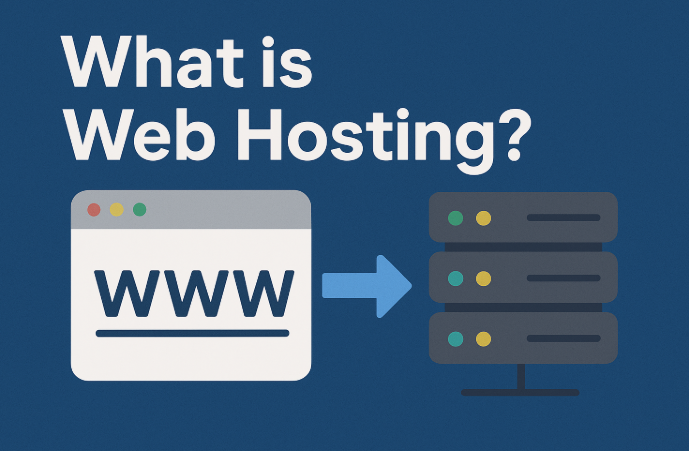Introduction
When you are about to make a website, one of the words that you hear initially is web hosting. During my first website creation five years ago, I had no idea about what hosting really was. I thought that buying a domain was all that was needed, but later realized that with no hosting, a domain is a useless address. I’ve had several hosting providers — from shared hosting for personal blogs to WordPress managed hosting for business websites — and I’ll be sharing what I’ve learned along the way.
What I’ll do in this tutorial is explain an overview of web hosting, how it works, the various types, and what you need to do when choosing a web host.
What is Web Hosting?
In simple words, web hosting is a service that stores your website’s files (HTML, images, video, databases) on a server and hosts them on the web. Your site is similar to a house. The address is the domain name, and the hosting is the land where the house sits. Without the hosting, others can’t physically come to your site.
From personal experience, choosing a suitable hosting provider is equivalent to choosing the right foundation for a house. A good hosting service ensures your website runs smoothly, is quick, and stays online 24/7.
How Does Web Hosting Work?
If someone types your domain name into a web browser, this is what happens behind the scenes:
- The browser contacts your hosting server.
- The server fetches your website files.
- Those files are served to the visitor as your website.
With me, at first when I began a blog, I signed up for an inexpensive hosting package. It worked initially, but the site would often go offline amid traffic surges. Later on, I migrated to cloud hosting, which was more performing and scalable. That experience helped me learn that the hosting you select has a direct influence on performance.
Types of Web Hosting
I’ve tried just about every type of hosting over the years. Here is a summary of the main options:
1. Shared Hosting
Definition: Multiple websites are hosted on one server and resources.
Best For: Beginners, personal sites, small sites.
My Experience: Where I started — cheap, but performance suffers if other sites on the same server use too many resources.
Pros
- Very affordable and beginner-friendly
- Easy setup, even for non-technical users
- Usually comes with free tools (email, SSL, cPanel)
Cons
- Slower performance during high traffic periods
- Limited resources and customization options
- Security risks due to server sharing
2. Virtual Private Server (VPS) Hosting
Definition: One physical server is divided into virtual slices.
Best For: Larger websites that need to have more control and stability.
Experience Tip: Transferred to VPS when my traffic increased. Gave me quicker speed and control than shared hosting.
Pros
- Dedicated resources for better performance
- Greater control and customization
- Scales better than shared hosting
Cons
- More expensive than shared hosting
- Requires some technical knowledge
- Limited scalability compared to cloud hosting
3. Dedicated Hosting
Definition: Your website’s dedicated server.
Best For: Big companies, high traffic websites.
Experience Tip: Only used it for clients. It is robust but costly. Worth it if your website gets heavy traffic.
Pros
- Maximum performance and reliability
- Full control over server configuration
- Enhanced security, since no one shares your server
Cons
- Very expensive compared to other options
- Requires advanced technical skills or a sysadmin
- Not necessary for smaller websites
4. Cloud Hosting
Definition: Your site is hosted on multiple servers connected through the cloud.
Best For: Scalability, start-ups, eCommerce sites.
Experience Tip: My own favorite. Cloud hosting will barely ever crash and can withstand traffic spikes.
Pros
- Highly scalable — pay for what you use
- Excellent uptime and reliability
- Handles sudden traffic spikes easily
Cons
- Pricing can be unpredictable with usage-based billing
- Slightly more complex setup and management
- Some providers charge extra for support features
5. Managed WordPress Hosting
Definition: Hostinger’s managed WordPress hosting is WordPress-tuned hosting with automatic security and updates.
Best For: Bloggers, WordPress business sites.
Experience Tip: Used it for client websites. Saves time but is more expensive.
Pros
- Optimized performance for WordPress
- Automatic updates and strong security
- Time-saving — less technical work needed
Cons
- More expensive than regular hosting
- Limited to WordPress sites only
- Some restrictions on plugins or customizations
Key Features to Look For in a Web Hosting Service
In my 5 years of experience with the use of hosting services, the following features always impress me:
- Uptime Guarantee: Look for 99.9% or higher uptime. Downtime means lost traffic and revenue.
- Speed & Performance: Fast loading sites help SEO and user experience.
- Security: SSL encryption, malware scanning, and backup are necessities.
- Customer Support: 24/7 support saved me countless times.
- Scalability: Make sure you can scale plans smoothly as your site grows.
- Pricing & Value: Cheap doesn’t mean affordable. Place price against reliability.
Why Good Hosting Matters (My Personal Lessons)
I learned the hard way through my own experience that poor hosting kills a website. My first blogs were plagued by:
- Slow page loads (which impacted SEO rankings).
- Regular downtime (visitors couldn’t access my site).
- Poor customer support (long waits for help).
Changing to a dependable hosting company totally revolutionized my web experience. My website loaded quicker, traffic improved, and I no longer worried about downtime.
Common Mistakes Beginners Make
- Picking the Cheapest Package: Inexpensive hosting may restrict your growth.
- Forgetting Backups: I once lost content for not having backups turned on. Lesson learned.
- Not Verifying Renewal Prices: Several hosts tend to have cheap first-year prices but jack up later.
- Overlooking Support Quality: Quality support is worth paying for.
Conclusion
Web hosting is the backbone of any site. Without it, your domain name is merely a name without anything behind it. Having gone back and forth between different host companies over the past five years, I can confidently say that getting the correct host will be the difference between making or breaking your online success.
If you’re starting out, shared hosting is fine. But as your site grows, consider upgrading to VPS, cloud, or managed WordPress hosting. Always prioritize reliability, speed, and support over just price.
FAQs About Web Hosting
1. What is the difference between a domain and hosting?
A domain is your website’s address (like example.com), while hosting is the server space where your website’s files are stored.
2. Do I need hosting when I already have a domain?
Yes. A domain alone will not display your site. You need to have hosting in order to launch your site.
3. How much does web hosting cost?
Shared hosting is as cheap as $2–$5 a month, while VPS and cloud hosting are in the range of $10 to $80+.
4. Which hosting type is best for beginners?
Shared hosting is best for beginners. It’s affordable and easy to set up.
5. Can I change hosting providers later?
Yes. You can migrate your website to another host if you’re not satisfied.
By understanding what web hosting is and how it works, you’ll be better prepared to choose a service that helps your website succeed — just like I learned through experience.

